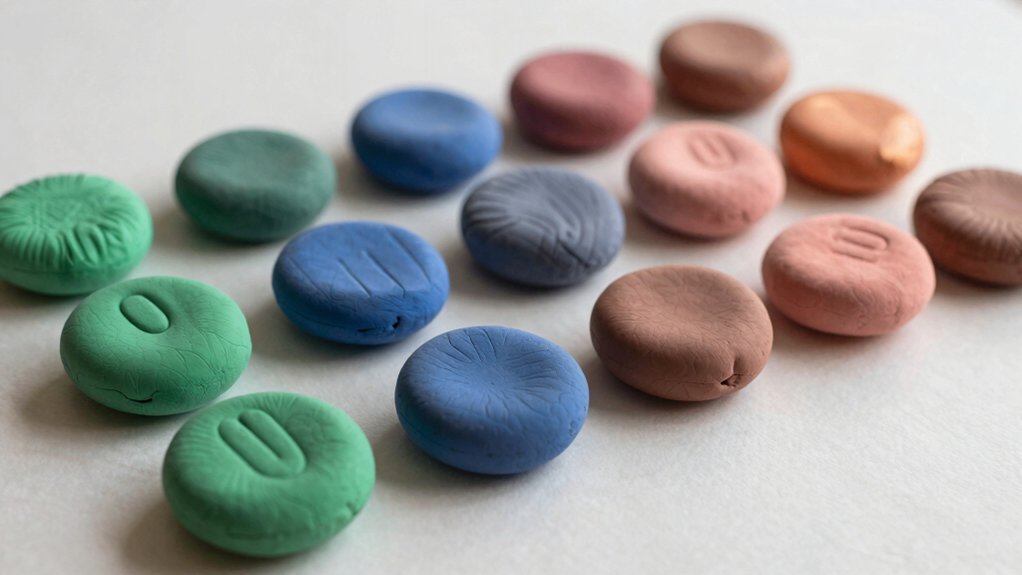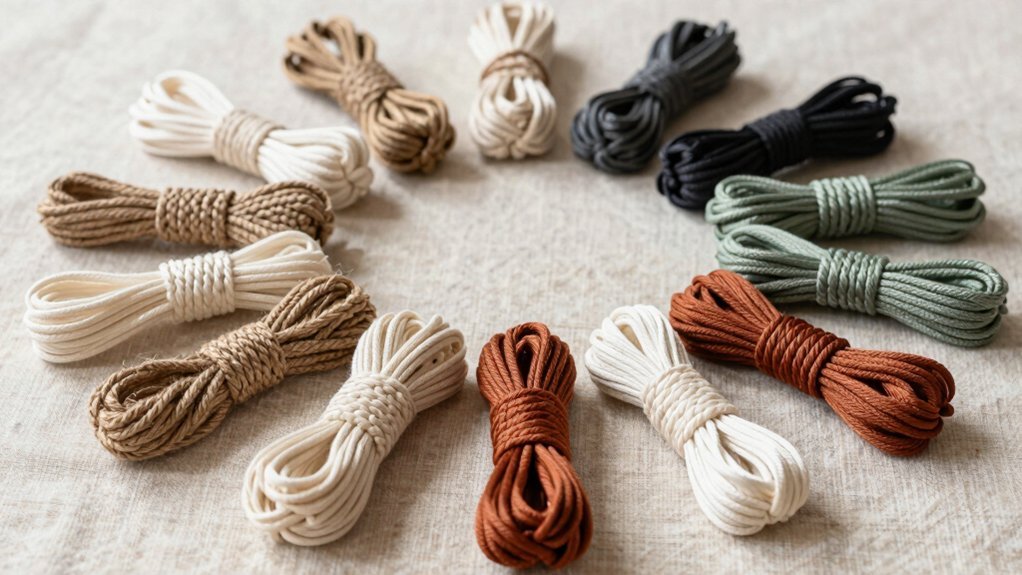You've probably noticed how your thoughts can feel like a tangled mess when they're stuck in your head. That's where therapeutic writing prompt cards come in – they're like conversation starters for your inner dialogue. Whether you're dealing with stress, seeking clarity, or simply want to understand yourself better, these carefully curated prompts can guide you through meaningful self-exploration. Let's examine seven distinctive card sets that'll help you transform those scattered thoughts into powerful insights.
Jewish Self Reflection Cards for Personal Growth & Journaling
The Jewish Self Reflection Cards offer a powerful therapeutic writing tool, ideal for individuals seeking structured personal growth through a Torah-based lens. You'll find 60 carefully crafted cards, including 10 specialized Elul cards for teshuva reflection, divided into manageable 5, 10, and 20-minute writing sessions.
You can start with just 5 minutes daily to experience meaningful transformation. The cards emphasize free writing without worrying about grammar or spelling, letting you focus on present-moment awareness. Their clear design and practical size make them easy to use and store. Whether you're a busy mom or a seasoned journaler, these cards complement existing spiritual practices while fostering self-love, mental strength, and emotional clarity.
Best For: Jewish individuals seeking structured self-reflection and personal growth through Torah-based journaling prompts, particularly those who want to incorporate meaningful writing practice into their daily spiritual routine.
Pros:
- Flexible time commitments with 5, 10, and 20-minute options make it accessible for busy schedules
- Clear, therapeutic writing prompts based on authentic Torah sources help facilitate deep self-understanding
- Well-organized format with specialized Elul cards for teshuva and practical storage solution
Cons:
- Limited to 60 cards which might require repetition for long-term use
- May not be as beneficial for those who prefer less structured or non-writing based reflection methods
- Specifically designed for Jewish audience, limiting broader appeal for general mindfulness practitioners
5-Minute Daily Writing Prompts: 501 Prompts for Creativity
Creative minds seeking daily writing inspiration will find these 501 prompts invaluable for developing their craft. You'll discover challenging prompts that effectively combat writer's block and enhance your creativity in just five minutes per day.
Whether you're a beginner or seasoned writer, these prompts fit seamlessly into your busy schedule. You'll appreciate how they stimulate fresh ideas while building consistent writing habits. Parents and teachers can adapt the prompts for younger writers, making them versatile for all skill levels.
You'll join a community of writers who've experienced renewed creativity and motivation through these engaging exercises. Share your journey with others who've found success in these thoughtfully crafted prompts.
Best For: Writers of all levels seeking daily creative inspiration, from beginners looking to develop a writing habit to experienced authors needing fresh perspective.
Pros:
- Five-minute format makes it easy to maintain a consistent daily writing practice
- 501 unique and challenging prompts that effectively combat writer's block
- Adaptable for different age groups and skill levels, making it versatile for families and classrooms
Cons:
- Some prompts may be too advanced for younger writers without adaptation
- No specific organization or difficulty progression through the prompts
- Limited guidance on how to expand prompts into longer writing pieces
RETHiNK Card Deck Mindful Conversation Starters (56 Questions)
Mindful conversation starters from the RETHiNK Card Deck offer an affordable entry point for educators, counselors, and group facilitators who want to spark meaningful discussions.
You'll find 56 thought-provoking questions that promote gratitude, insight, and compassion. While the prompts may seem simple, they effectively generate deep conversations in meditation classes, team-building sessions, and student writing exercises.
The deck's versatility makes it particularly effective with middle and high school students, though some adults might find the questions basic. Despite minor concerns about card durability, users praise the deck's quality and value. Whether you're leading clinical work or casual gatherings, these cards can help build connections and shift perspectives within your group.
Best For: Educators, counselors, and group facilitators working with middle to high school students who want an affordable tool to spark meaningful discussions and promote mindfulness.
Pros:
- Versatile tool that works well in various settings including classrooms, therapy sessions, and team-building exercises
- Affordable price point compared to similar conversation starter decks
- Effectively promotes important skills like gratitude, insight, and compassion
Cons:
- Questions may be too basic for sophisticated adult discussions
- Some concerns about card durability and potential damage
- May require additional facilitation or modification to engage more mature audiences effectively
500 Journal Prompts for Mental Health and Creativity
Seeking a versatile tool for daily reflection and emotional growth? The 500 Journal Prompts for Mental Health and Creativity offers an extensive collection of thought-provoking questions, ranging from lighthearted to profound.
You'll find prompts that spark joy ("What makes you smile?") and those that challenge your perspectives ("Is dishonesty ever appropriate?"). Try using a random number generator to select daily prompts, adding spontaneity to your journaling practice.
While it doesn't include writing space, these prompts effectively combat writer's block and serve as powerful catalysts for self-discovery. Whether you're new to journaling or experienced, you'll appreciate how these questions help process emotions and foster personal growth during challenging times.
Best For: Individuals seeking structured self-reflection, mental health support, or creative writing inspiration, whether they're beginners or experienced journalers looking for fresh perspectives.
Pros:
- Diverse range of prompts covering both light and deep topics
- Excellent tool for breaking through writer's block and maintaining consistent journaling practice
- Facilitates emotional processing and personal growth through thoughtful reflection
Cons:
- No space provided for writing responses
- May disappoint those expecting a traditional journal format
- Some prompts might feel repetitive or too basic for experienced journalers
The Shadow Work Journal: A Guide to Integrate and Transcend Your Shadows
The Shadow Work Journal serves as an indispensable companion for individuals ready to confront their hidden aspects and emotional wounds through guided self-reflection. You'll find yourself maneuvering through thoughtfully structured sections that address childhood wounds, limiting beliefs, and unresolved emotions.
The journal's soothing aesthetic creates a safe space for your introspective journey, where you can explore your shadows at your own pace. With its blend of psychological theory and practical exercises, you'll uncover deep-seated patterns while maintaining self-compassion. Though some sections may feel like standard questionnaires, the overall approach helps you achieve profound personal insights and transformative changes in your healing journey.
Best For: Individuals committed to deep personal growth who are ready to explore their subconscious patterns, emotional wounds, and limiting beliefs through structured self-reflection exercises.
Pros:
- Thoughtfully structured progression from basic to complex introspective work
- Creates a safe, non-judgmental space for self-exploration with soothing aesthetics
- Flexible format allows users to work at their own pace and revisit sections as needed
Cons:
- Some sections may feel like generic questionnaires rather than deep reflective exercises
- May be overwhelming for those new to shadow work or emotional processing
- Requires significant time commitment and emotional energy to work through effectively
Zenspirations Dangle Designs Expanded Workbook
Creative minds seeking expressive outlets will find the Zenspirations Dangle Designs Expanded Workbook an invaluable resource for enhancing their artistic journey. Through clear illustrations and instructions by Joanne Fink, you'll learn to create enchanting dangling doodles perfect for journals, cards, and gifts.
You'll benefit from practice sheets that you can scan and reprint, allowing for unlimited experimentation. The book's versatile applications extend to bookmarks, signs, and pen pal correspondence. While some users note concerns about size and price, most praise its lasting value and ability to spark creativity. Whether you're new to artistic expression or looking to expand your Zentangle practice, this workbook serves as a continuous source of inspiration.
Best For: Creative enthusiasts and hobbyists looking to enhance their lettering, journaling, and craft projects with decorative dangle designs and patterns.
Pros:
- Clear, easy-to-follow instructions and illustrations from Joanne Fink
- Includes reusable practice sheets that can be scanned and reprinted
- Versatile applications for various projects from cards to bookmarks
Cons:
- Some users feel the book size is smaller than expected
- Price point may be high for the content provided
- May be too basic for advanced artists seeking complex techniques
Stages Learning Materials Language Builder Occupation Picture Flashcards
Language professionals and educators working with diverse learners will find Stages Learning Materials' occupation flashcards particularly valuable for developing basic communication skills. These 115 photographic cards showcase various careers with both male and female representations, helping you teach receptive and expressive language skills.
The cards' hi-gloss finish guarantees durability, while the activity booklet provides structured learning exercises. You'll appreciate the diverse ethnic representation, though some professions could use broader inclusion. While the images may appear dated and lack functional descriptions, the notation section on card backs helps track progress. At 3.5 x 5 inches, they're ideal for individual or small group instruction.
Best For: Speech therapists, special education teachers, and early childhood educators working with students ages 3+ who need to develop basic language and career awareness skills.
Pros:
- High-quality, durable cards with glossy finish and professional photographs
- Includes both male and female representations of occupations with ethnic diversity
- Comes with activity booklet and notation section for tracking progress
Cons:
- Limited variety of occupations with some common careers missing
- Photos appear outdated and may lack clarity for job identification
- No descriptions of job functions included on the cards
Factors to Consider When Choosing the Most Therapeutic Writing Prompt Cards
When selecting therapeutic writing prompt cards, you'll want to evaluate key factors like structure, format, and therapeutic depth to guarantee they match your healing goals. You should consider the time investment required for each prompt and check that the visual elements resonate with your preferences. It's also essential to verify that the content reflects cultural sensitivity and inclusivity for meaningful self-expression.
Structure and Writing Format
Selecting therapeutic writing prompt cards requires careful consideration of their structural elements and format to guarantee maximum effectiveness. You'll want to look for cards that offer varied time options, such as 5, 10, and 20-minute prompts, to fit your schedule and energy levels.
The best cards encourage free writing without getting caught up in grammar or spelling, allowing you to focus purely on self-expression. Look for prompts that include clear instructions and explanations, making them easy to understand and implement. Choose cards that feature specific themes like emotional awareness and personal growth to guide your introspective journey. The format should be visually appealing and portable, enabling you to incorporate the practice into your daily routine with minimal effort.
Therapeutic Focus and Depth
The therapeutic value of writing prompt cards hinges primarily on their ability to facilitate meaningful self-exploration and emotional growth. When selecting cards, you'll want prompts that probe beyond surface-level reflection, encouraging you to examine deep-seated emotions and limiting beliefs.
Look for cards that guide you through progressive levels of self-discovery, starting with gentler questions before moving into more challenging territory. The best therapeutic prompts should resonate with your personal experiences while fostering self-compassion throughout the process. You'll benefit most from questions that invite non-judgmental exploration of your thoughts and feelings.
Consider sets that address specific emotional challenges you're facing, as targeted prompts can lead to more profound breakthroughs. The cards should create a balanced journey of self-reflection, combining emotional awareness with practical insights for personal transformation.
Time Commitment Required
Time management plays an essential role in choosing therapeutic writing prompt cards that you'll actually use consistently. When selecting your cards, look for options that match your daily schedule, whether you have 5 minutes or can dedicate up to 20 minutes per session.
You don't need to spend hours writing to experience benefits. Even a 5-minute daily practice can be effective for personal growth and emotional healing. Many card sets offer time-specific prompts, letting you choose exercises based on your available time each day. To maintain a regular practice, verify the time commitment aligns with your lifestyle. The key is finding cards that fit naturally into your routine, making it easier to stick with your therapeutic writing journey and achieve meaningful self-reflection.
Visual Design Elements
Visual appeal serves as an essential factor when choosing therapeutic writing prompt cards, as design elements directly influence your engagement and emotional response during reflection exercises. Look for cards featuring well-organized layouts and clear illustrations that won't distract you from the introspective process.
Consider cards with thoughtfully selected color schemes and typography that create a calming atmosphere, enhancing your therapeutic writing experience. You'll want to guarantee the cards are sized appropriately for comfortable handling and easy storage while maintaining their visual impact. High-quality materials, particularly those with a glossy finish, will protect your cards from wear and tear during regular use.
When evaluating design elements, remember that the right combination of aesthetics and functionality will support your journey of self-discovery and healing.
Cultural Sensitivity Content
When selecting therapeutic writing prompt cards, cultural sensitivity plays a pivotal role in creating an inclusive and meaningful self-reflection experience. You'll want to choose cards that feature prompts representing diverse cultural perspectives and experiences, ensuring that users from all backgrounds can connect with the content authentically.
Look for prompts that use inclusive language and avoid cultural stereotypes or appropriation. The cards should incorporate themes that resonate across different cultural contexts while respecting unique cultural expressions and values. Pay attention to how examples and scenarios are presented – they should reflect various lived experiences and cultural narratives. By choosing culturally sensitive prompt cards, you'll create a more supportive and effective therapeutic writing environment where everyone feels seen, heard, and validated in their journey of self-discovery.
Prompt Variety Range
A diverse range of therapeutic writing prompts serves as the foundation for meaningful self-discovery and emotional growth. When selecting prompt cards, you'll want to guarantee they offer a mix of light and deep introspective themes that can match your varying emotional states and needs.
Look for cards that cover multiple aspects of personal development, from self-love and gratitude to exploring fears and limiting beliefs. You'll benefit from prompts with different complexity levels, allowing you to engage based on your comfort and readiness. Consider sets that include both quick reflection prompts for busy days and in-depth exploration prompts for times when you can dive deeper. This variety not only keeps your writing practice fresh but also helps you maintain consistency while addressing different areas of your life's journey.
Frequently Asked Questions
How Long Should I Spend on Each Writing Prompt Card?
You'll want to spend 15-30 minutes per prompt, but don't feel restricted by time. Trust your instincts—write until you've expressed yourself fully or reached a natural stopping point in your reflection.
Can Therapeutic Writing Prompt Cards Replace Professional Therapy?
While writing prompts can support your mental health journey, they can't replace professional therapy. You'll benefit most when you use them alongside therapeutic treatment, as therapists provide unique expertise and personalized guidance.
Are Writing Prompt Cards Effective for Treating Specific Mental Health Conditions?
While writing prompts can support your mental health journey, they aren't designed to treat specific conditions. You'll get the best results using them alongside professional therapy for diagnosed mental health disorders.
What Age Group Are Therapeutic Writing Prompt Cards Most Suitable For?
You'll find therapeutic writing prompts most effective from adolescence through adulthood, typically ages 13 and up. They're particularly impactful for teens and adults who can engage in deeper self-reflection and emotional expression.
Should I Share My Prompt Card Responses With Others or Keep Private?
It's entirely your choice. You can keep your responses private for personal reflection, or share them with trusted friends, family, or therapists. There's no right answer – do what feels most comfortable and beneficial for you.
In Summary
Whether you're seeking spiritual growth, mental health support, or creative inspiration, these therapeutic writing prompt cards offer a path to deeper self-discovery. You'll find options that match your personal style and comfort level, from quick daily prompts to in-depth shadow work. Remember to choose cards that resonate with your goals and values. Take that first step toward healing through the transformative power of therapeutic writing.





Leave a Reply